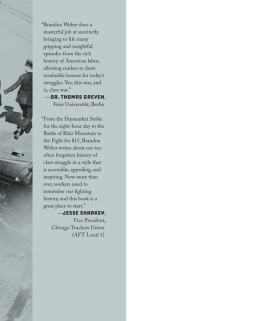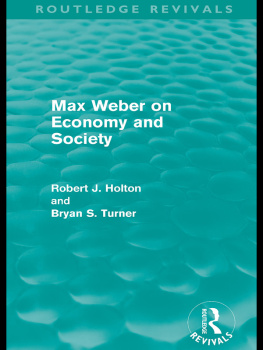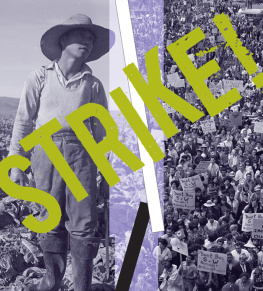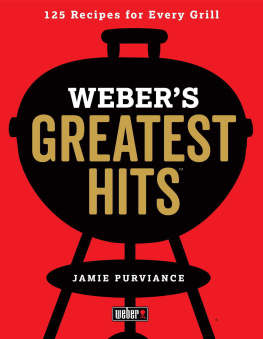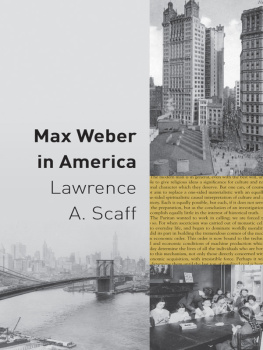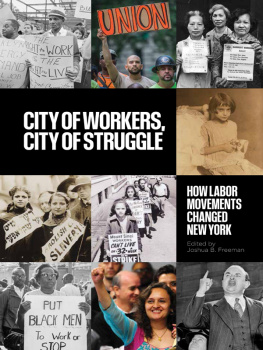CLASS WAR, USA
CLASS WAR, USA
Dispatches from
Workers Struggles
in American History
BRANDON WEBER

2018 Brandon Weber
Published in 2018 by
Haymarket Books
P.O. Box 180165
Chicago, IL 60618
773-583-7884
www.haymarketbooks.org
ISBN: 978-1-60846-871-3
Trade distribution:
In the US, Consortium Book Sales and Distribution, www.cbsd.com
In Canada, Publishers Group Canada, www.pgcbooks.ca
In the UK, Turnaround Publisher Services, www.turnaround-uk.com
All other countries, Ingram Publisher Services International,
Cover design by Michel Vrana. Cover image from 1934 Minneapolis teamster strike.
This book was published with the generous support of Lannan Foundation and Wallace Action Fund.
Library of Congress Cataloging-in-Publication data is available.

To my wife: Nothing and nobody gives me more inspiration
To my children: My wish is that the world you come to live in will not need the kinds of struggles you see here. But if it does, I know you will grow to meet them, and you will take them on like the champions that you are
And to all of my parents, for showing me what it means to fight like hell for the world you want to live in
FOREWORD
Brandon Weber is a fighter. Hes a damn fine storyteller, too.
In this new collection of stories, Weber tells the tales of those who came before: their lives, their struggles, their fights, and their victoriesvictories we share in (and take for granted) to this day. His writing reads less like a historical text and more like a playbook for twenty-first-century organizing.
I think thats the point.
Were in perilous times. But there have been perilous times before. In fact, there are few, if any, struggles facing the working class of 2018 that havent already been met head-on by the working classes of the past. And therein lies what makes this collection so special.
What did they do? How did they respond? These questions are not only answered within these slender but insightful texts but also serve as a North Star in helping us figure out what we should consider as we move forward and navigate our own treacherous shoals.
This is not a collection of mini-biographies. You wont find stories of how some individual won a victory all on their own here, gang. No, this book is about those who hit the streets, walked the picket, and did the fightingall side by side with their sisters and brothers. Im reminded of something written by US Civil War veteran Sam Watkins, in describing his memoir, Co. Aytch: To tell of the fellows who did the shooting and killing, the fortifying and ditching, the sweeping of the streets, the drilling, the standing guard, picket and vidette, and who drew (or were to draw) eleven dollars per month and rations, and also drew the ramrod and tore the cartridge.
Its those stories Brother Weber has presented herestories of those whove done the fighting for the working class.
This is also a story about the power of solidarity.
I wont be so clich as to quote the late Margaret Mead, but as Margaret Mead said, Never doubt that a small group of thoughtful, committed citizens can change the world; indeed, its the only thing that ever has.
This collection serves as a testimony to that claim.
As this volume reflects, while the cause du jour has changed from time to time, in the end, its solidarity that has always led to positive change for humanity. It was solidarity that won women the right to vote. It was solidarity that built the labor movement. It was solidarity that drove the civil rights movement. It was solidarity that led to marriage equality. It was solidarity that ended slavery in the nineteenth century and it will be solidarity that will prevents it in the twenty-first.
I look forward to seeing you in the streets. I look forward to our shared fights and victories. I look forward to a new era of working-class fighters, giving Brother Weber good stories for his sequel.
Will Fischer
Washington, DC
February 2017
INTRODUCTION
I grew up the son of a union man, a member of UAW Local 838. My parents split when I was six, and I got to learn what it was like to live with a strong womana woman who wouldnt take shit from anybody.
I stayed in touch with my dad enough to know when the John Deere plant was on strike, or when the workers were locked out and times were rough, rations of 1970s-era government cheese and powdered milk were being utilized by many families in the area. He spent thirty-six years on the shop floor, loved pretty much every minute of it, and was an active union steward for a long time, helping to defend workers who needed an advocate along the way.
My stepmother was local president of the town textile shop.
Not five miles from our house, Rath Packing company would belch out its rather ominous odors every morning as the kill line got into action. All those workers were union members, and many of the kids I grew up with had parents who worked there or at John Deere or some other union shop in town. Generally, they all made a pretty good living and could count on a pension and health care in retirement.
Why am I listing credentials like this? Because were in danger of losing labor unions from our landscape. With them go good wages, benefits, health care, pensions, control over work life, dignity, and so much more.
The stories I have told here are about some of the things that working people went through to make a better life for themselves and for their children and their future grandchildren. Really, thats what unions are all about: lets set some ground rules so that future workers can get a piece of that American Dream pie. I have purposefully chosen stories that capture the spirit of fighting back even when sometimes the battles end in apparent defeat for workers and veterans.
As my friend Will says in his foreword, weve been here before; unions have been on the ropes, and the companiesthe 1 percent, to use current terminologyhave taken away from working people everything but the bare bones needed to survive if they even left that.
We clawed our way backthe collective, down-through-the-generations we, the folks who fought at Ludlow, and Blair Mountain, and the US Postal Service, and the Lowell mills, and on the streets, and in the halls of Washington, DC.
We will arise again count on it!
July 2017
JOE HILL
Labors Best-Known Songwriter Refused to be Buried in the State of Utah
If youre a fan of folk music or words and music about working people, youre probably familiar with the song Joe Hill.
The song, originally written as a poem by Alfred Hayes and set to music by Earl Robinson, has been performed for decades by the likes of Paul Robeson, Joan Baez (at Woodstock in 1969), Phil Ochs, and Billy Bragg. Among the more memorable renditions is a version by Bruce Springsteen.
The songs lyrics recall a dream in which Joe Hill, a hero to workers who was framed on a murder charge and sentenced to death, returns in a supernatural form, symbolizing the spirit of the labor movement.
I dreamed I saw Joe Hill last night
Alive as you or me
Says I, But Joe, youre ten years dead

